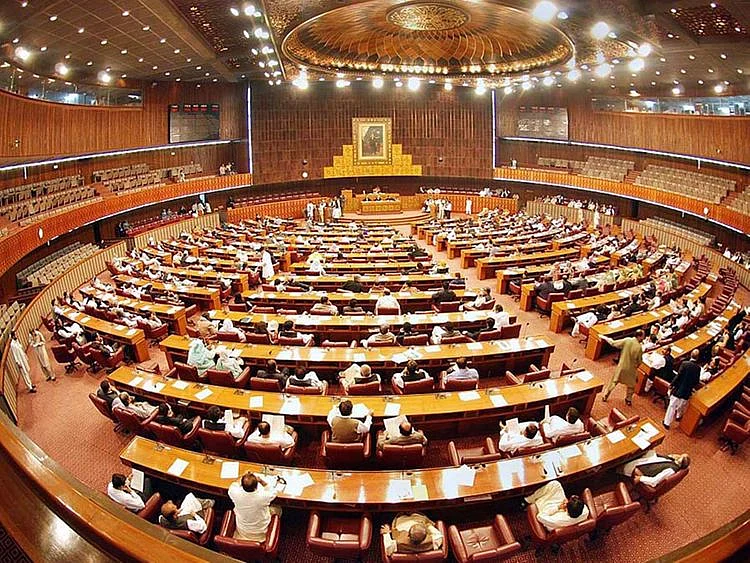Pakistan’s parliament debates resurgence of TTP militants in KP regions
Locals in select regions of Khyber Pakhtunkhwa province fear the return of militants

Islamabad: Pakistan’s parliament finally addressed the fear and confusion about the resurgence of the banned militant group, Tehreek-e-Taliban Pakistan (TTP), in select regions of Khyber Pakhtunkhwa (KP) province.
Defence Minister Khawaja Asif acknowledged the presence and militant activities in Pakistan’s KP province first time since the Taliban’s takeover of Kabul last year. Speaking on the floor of the National Assembly on Wednesday, he said that the law and order situation was a “national issue” and needed attention.
The issue was raised by MNA Mohsin Dawar who cautioned that terrorism could spread across the province, citing that a Pakistan Tehreek-e-Insaf (PTI) Member of the Provincial Assembly had recently been attacked and a police official abducted by militants in Swat. However, the TTP has denied that it carried out the attacks.
Referring to the peace talks between the government and the militant group, Khwaja Asif hoped that the talks would continue, help sustain peace and that the TTP would back off from their demands to enforce “their own [governance] system” in the province.
However, “the danger is gradually growing,” Asif said, citing protests by locals in Swat, Dir and nearby areas of the province against the Taliban presence. The minister said that a committee comprising political elders had been constituted to resolve issues that have halted trade at two border points at Ghulam Khan and Kharlachi where pro-tests have been reported in the past two weeks.
Former prime minister and Pakistan Tehreek-e-Insaf (PTI) chairman Imran Khan also expressed concerns about the resurgence of TTP in Swat and other areas of KP, where his party is in majority. “My party leaders in Khyber Pakhtunkhwa are being targeted. Many are receiving threats from the TTP,” Khan said in a speech, terming it as part of the conspiracy to weaken PTI provincial government.
Media reports and videos shared on social media showed local people protesting against the resurgence of the Taliban in Swat. PTI member of KP Assembly Malik Liaquat Ali Khan was critically injured in a targeted attack in the Maidan Gul area of Lower Dir District.
A police official and six others, who were abducted, have been released after being held hostage for 12 hours by unidentified gunmen, local media reported. The journalists of Swat have reported incidents of harassment and demands of extortion money from people believed to be linked with TTP.
The fears of TTP resurgence came following the death of TTP commander Omar Khalid Khorasani in an explosion in the Paktika province of Afghanistan with three other militants. The TTP is a separate group and not officially part Afghan Taliban who seized power in Kabul last year. TTP is believed to be behind some of the deadliest terror at-tacks in Pakistan in recent years.
Peace talks
Pakistan’s government began negotiations with the TTP in October last year. The talks were brokered by the Afghan Taliban government. Recently, Pakistan’s information minister Marriyum Aurangzeb confirmed ongoing peace talks between the banned group and a 50-member Pakistani jirga delegation.
This was the first time that the federal government publicly acknowledged negotiations with the group and also welcomed the TTP’s announcement of a ceasefire. In June 2022, top Pakistani civilian and military leaders discussed the progress in talks and assured that the dialogue or any peace deal with the group would be subject to parliamentary approval.
Experts warn against talks
Experts have warned against entering into peace talks with the TTP, especially af-ter the attacks on Pakistani security forces intensified. They argue that the talks may legitimize TTP which can stage a comeback, making it more difficult for Islamabad to contain militancy.
“With Pakistan already facing a plethora of economic and political crises, and ruled by a coalition sans a mandate, the resurgence of TTP is bad news,” Syed Ali Zia Jaffery, Research Associate, Center for Security, Strategy and Policy Research at The University of Lahore, told Gulf News. The group entering settled areas should worry the country’s policymakers, he says.
“Because it shows that the group still retains the capacity to fight and hold territory. Absent immediate actions by concerned authorities, the situation could go out of hands.” Ali Zia suggested that “The government must clearly communicate what its approach is, and if it plans on using force against the group, it should do so without wasting much time, simply because a delay would give breathing space to the Taliban.”
In 2021, Pakistan witnessed a 56 per cent surge in militant attacks despite a one-month ceasefire by TTP after a consistent decline in militant attacks for six years, according to Islamabad-based think tank Pakistan Institute for Conflict and Security Studies (PICSS).
The reports of militant activities in Swat come as attacks on security forces spiked in the tribal districts in recent months. At least four Pakistani soldiers were killed in a suicide blast this week in the Mir Ali area of North Waziristan district in Khyber Pakhtunkhwa.
This district and the region were once considered the hub of militant groups as Pakistan suffered serious fallout from the US-led war in Afghanistan that began in 2001 but Pakistan’s military operations since 2014 helped root out terrorist groups from the region.
Sign up for the Daily Briefing
Get the latest news and updates straight to your inbox
Network Links
GN StoreDownload our app
© Al Nisr Publishing LLC 2025. All rights reserved.